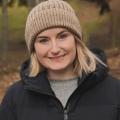
A grandfather who rebuilt his life after a stroke has shared his story of living with language disorder aphasia and helping others negotiate life with the condition.
Martin McKelvie suffered a stroke in March 2022 which left him with the disorder which makes it difficult to communicate.
There had been no hint of any health problems beforehand for the 57-year-old, who was a regular at the gym, had run marathons and taken part in Tough Mudders, and had a demanding job as an area manager in parks and cleansing with Glasgow City Council (GCC).
As he parked in his driveway after work one day, however, suddenly he couldn’t move or speak.
Wife Trisha, who by chance had turned down an extra shift at work and was home at the time, assumed he was on the phone when he didn’t immediately come in.
Martin, from Barrhead, said: “I knew I was having a stroke. I tried to get out of the car and couldn’t move. I couldn’t do anything.
“After about 10 minutes Trisha came outside and realised what was happening immediately and called 999."
The dad-of-two was admitted to the Royal Alexandra Hospital in Paisley but then was almost immediately transferred to the Queen Elizabeth University Hospital in Govan because of the seriousness of his condition.
His physical recovery was slow and helped by intensive physiotherapy and occupational therapy, but his speech did not return and the family were told Martin had aphasia.
None of them had ever heard of the condition or realised what it might mean for Martin.

Determined to return to work, he worked hard with the various therapists, including a speech and language specialist and a stroke psychologist.
While his speech gradually improved, he still struggled to find everyday words or even say his own name or understand a calendar.
“I was so sure I could go back to work, but the therapist was so honest with me,” he said.
“She told me I was miles off going back to doing what I’d done, like working with spreadsheets and writing reports.
“In my job, I’d have to speak to maybe 100 men at a time. How could I do that when I couldn’t even remember the months of the year?”
Just four months short of marking 40 years of service with GCC, Martin took medical retirement in April 2023.
He described his recovery as two steps forward and one step back at the time, admitting he felt depressed and isolated by the effects of the stroke.
His experience aligns with the findings of a new report recently released by Chest Heart & Stroke Scotland which revealed that poor mental health and loneliness are severely impacting people in Scotland living with aphasia.
The communication disorder affects one in three stroke survivors and it is estimated that there are over 40,000 people in Scotland living with the condition.
To help martin, his occupational therapist (OT) told him Chest Heart & Stroke Scotland could offer him some support, but he was reluctant to visit their communication support group in Paisley as he felt this was not for him.
The OT kept insisting and Trisha, who had taken three months off work to help her husband recover, and his daughter Caroline persuaded him to go.
“I was very nervous," explained Martin.
"I wasn’t sure if I’d go back, but my daughter told me I would.
“I know there are a lot of people who are physically worse off than me, but we all share the same experiences. That’s what has been so good about the group.
"Everyone understands what the others are going through."
He knows he has come a long way in the last 18 months and is so glad Trisha and Caroline persuaded him to go as the group has made a real difference to his recovery and allowed him to support others.
"Lynette Hall (who runs the group) recently asked me to sit with a new guy at the group and give him a bit of help with reading," said Martin.
"I was so nervous, I was sweating. I used to do lots of training in my job and I was never fazed by it, but doing this made me so apprehensive.
"When the group was over and we were walking out, he came over to talk to me and we spoke for ages.
"We spoke for so long his wife eventually came to get him.
“I couldn’t have imagined I’d be the one now helping someone else do the same thing, but being part of the group has given me some confidence back.”



Comments & Moderation
Readers’ comments: You are personally liable for the content of any comments you upload to this website, so please act responsibly. We do not pre-moderate or monitor readers’ comments appearing on our websites, but we do post-moderate in response to complaints we receive or otherwise when a potential problem comes to our attention. You can make a complaint by using the ‘report this post’ link . We may then apply our discretion under the user terms to amend or delete comments.
Post moderation is undertaken full-time 9am-6pm on weekdays, and on a part-time basis outwith those hours.
Read the rules hereLast Updated:
Report this comment Cancel